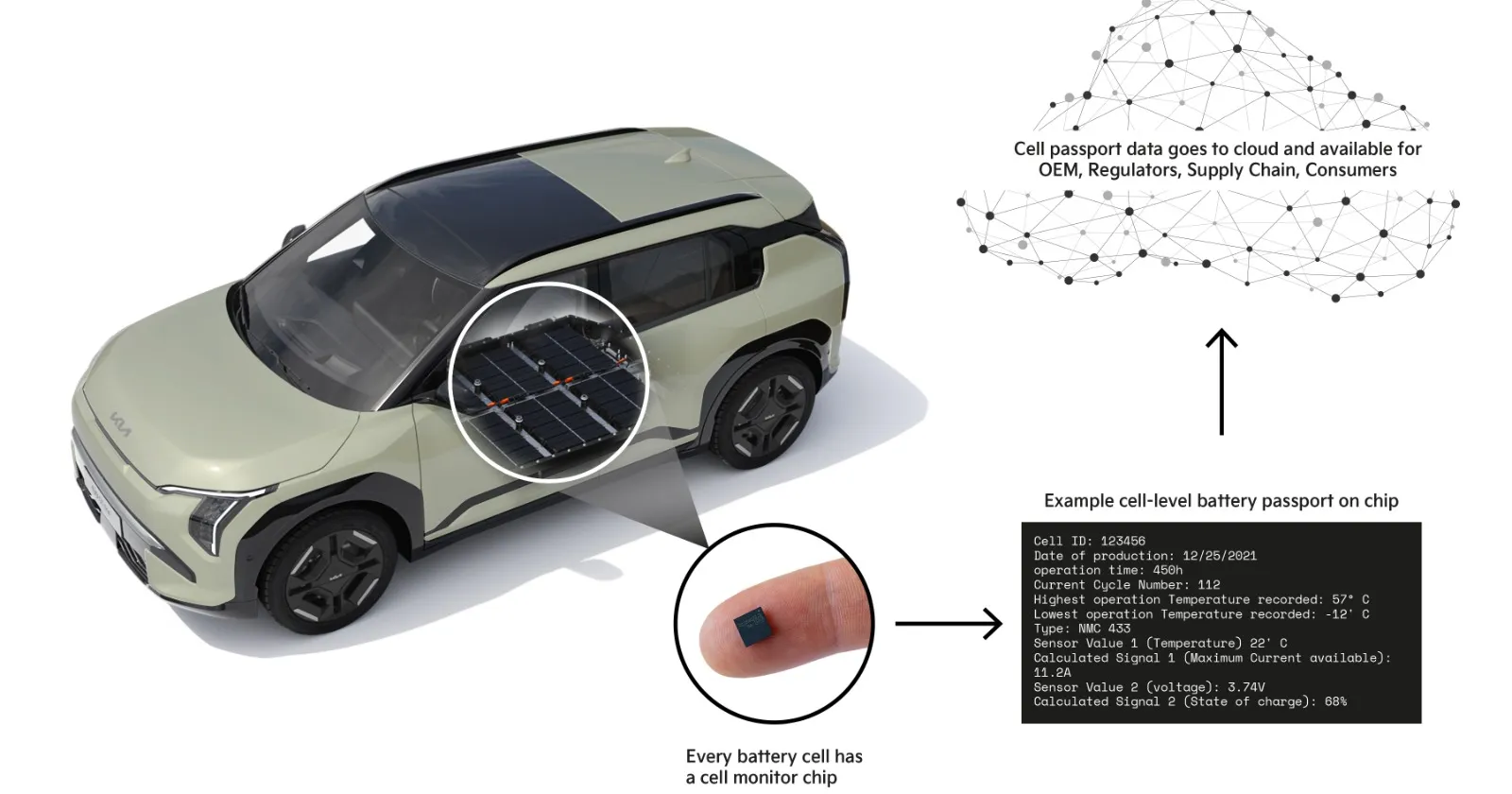
Kia's initiative utilises a sophisticated Dukosi battery cell monitoring system that enables real-time tracking of individual battery cells rather than conventional pack-level monitoring.

Share Post

Kia's initiative utilises a sophisticated Dukosi battery cell monitoring system that enables real-time tracking of individual battery cells rather than conventional pack-level monitoring.
Kia Europe has achieved a ground-breaking milestone by becoming the first automotive manufacturer to publicly trial cell-level battery passport technology. The initiative, conducted using a Kia EV3 equipped with advanced monitoring systems, represents a significant advancement in electric vehicle battery transparency and traceability ahead of European Union regulations.
The Korean automaker's trial emerged from the urgent need to address impending EU Battery Regulation requirements, which mandate digital battery passports for all electric and industrial batteries exceeding 2 kWh capacity from February 2027. The regulation forms part of the European Union's broader sustainability framework, requiring manufacturers to provide comprehensive lifecycle data for batteries sold within the bloc.
Kia's initiative utilises a sophisticated Dukosi battery cell monitoring system that enables real-time tracking of individual battery cells rather than conventional pack-level monitoring. This granular approach provides unprecedented visibility into battery State of Health (SoH), enabling targeted repairs at the cellular level and potentially extending battery lifespan whilst reducing maintenance costs.
The South Korean manufacturer's decision to pioneer this technology stems from multiple regulatory and commercial pressures. Marc Hedrich, President and CEO at Kia Europe, emphasised the company's commitment to "set a new standard for customers regarding battery transparency and performance". Beyond regulatory compliance, the system addresses growing consumer demands for battery reliability information, particularly crucial given batteries represent approximately 40% of electric vehicle costs.
The initiative also responds to safety concerns following numerous EV battery fire incidents, particularly where manufacturers had mixed battery cells of different vintages within modules. Such practices create performance disparities and safety hazards when older cells nearing expiry are combined with newer ones.
Whilst Kia leads in public cell-level trials, other manufacturers have pursued battery traceability initiatives with varying success. BMW, Mercedes-Benz, and Volkswagen have invested substantially in battery traceability systems, with individual implementations costing between several million pounds. However, these efforts have primarily focused on pack-level monitoring rather than cellular granularity.
Tesla has adopted blockchain technology for sustainable material sourcing, particularly for cobalt and nickel traceability, but hasn't achieved public cell-level passport implementation. The Global Battery Alliance, comprising manufacturers including Audi, Tesla, and Volkswagen, launched battery passport proof-of-concepts in 2023, yet none matched Kia's cellular-level precision.
Ford Motor Company initiated a six-month battery passport pilot utilising blockchain technology and IoT sensors, whilst multiple consortia involving major cell manufacturers representing over 80% of global EV battery market share have trialled sustainability data collection. Despite these efforts, none have publicly demonstrated the comprehensive cell-level monitoring that Kia has achieved.
Tata Punch EV Launch Tomorrow: Features, Specs, Price Expected
Acko Drive Team 19 Feb, 2026, 12:44 PM IST
JSW Begins Independent Journey in India’s Auto Industry with CVs
Acko Drive Team 19 Feb, 2026, 11:33 AM IST
Volkswagen Tayron R-Line Launched In India, Priced At ₹46.99 Lakh
Acko Drive Team 19 Feb, 2026, 9:22 AM IST
iOS 26.4 CarPlay Public Beta Previews Video Functionality, Conversational AI Apps
Acko Drive Team 19 Feb, 2026, 9:06 AM IST
Audi SQ8 India Launch on March 17: What to expect
Acko Drive Team 19 Feb, 2026, 8:44 AM IST
Looking for a new car?
We promise the best car deals and earliest delivery!
